Charles E W Bean, Diaries, AWM38 3DRL 606/244/1 - 1916 - 1933 - Part 20
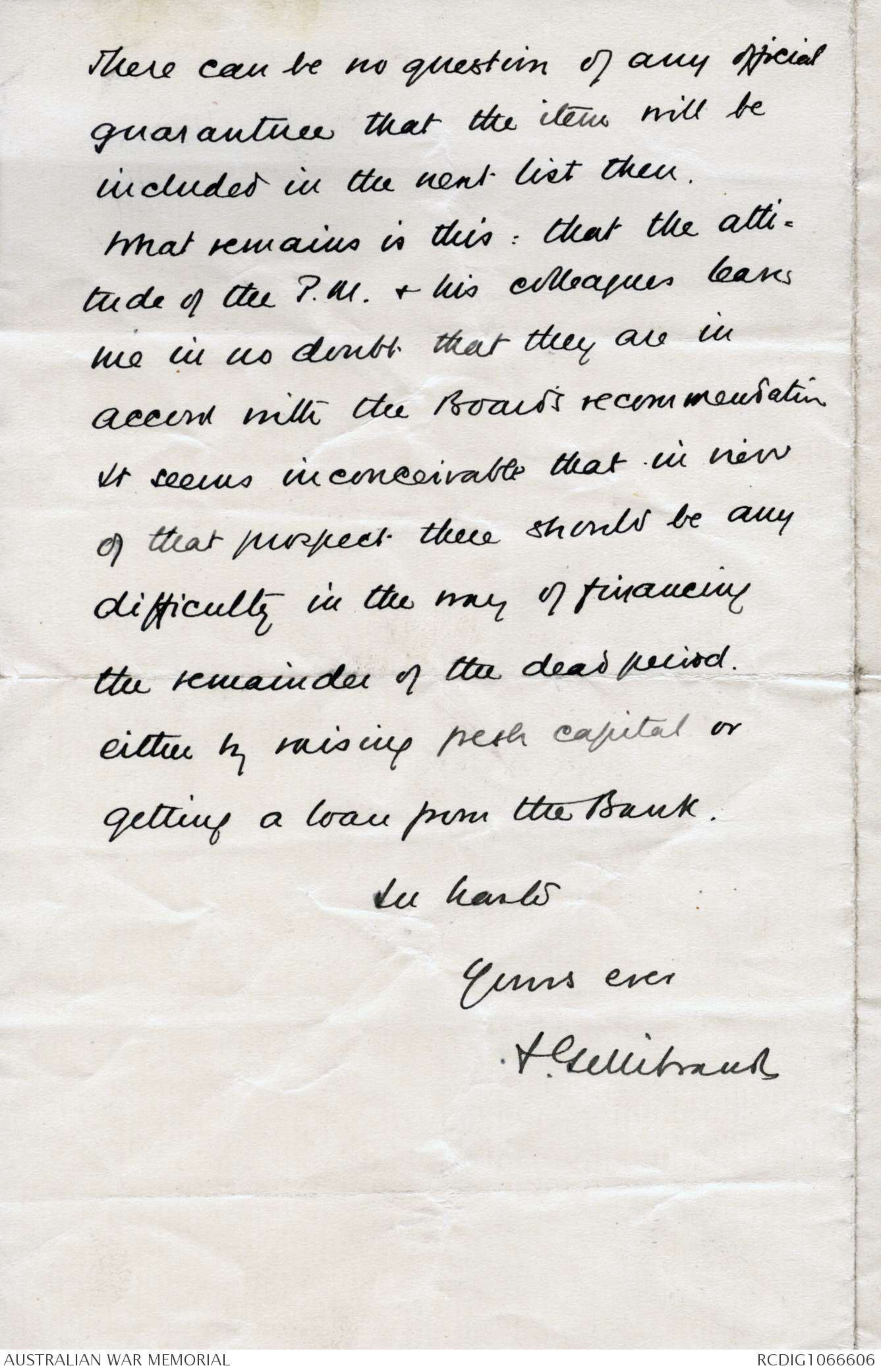
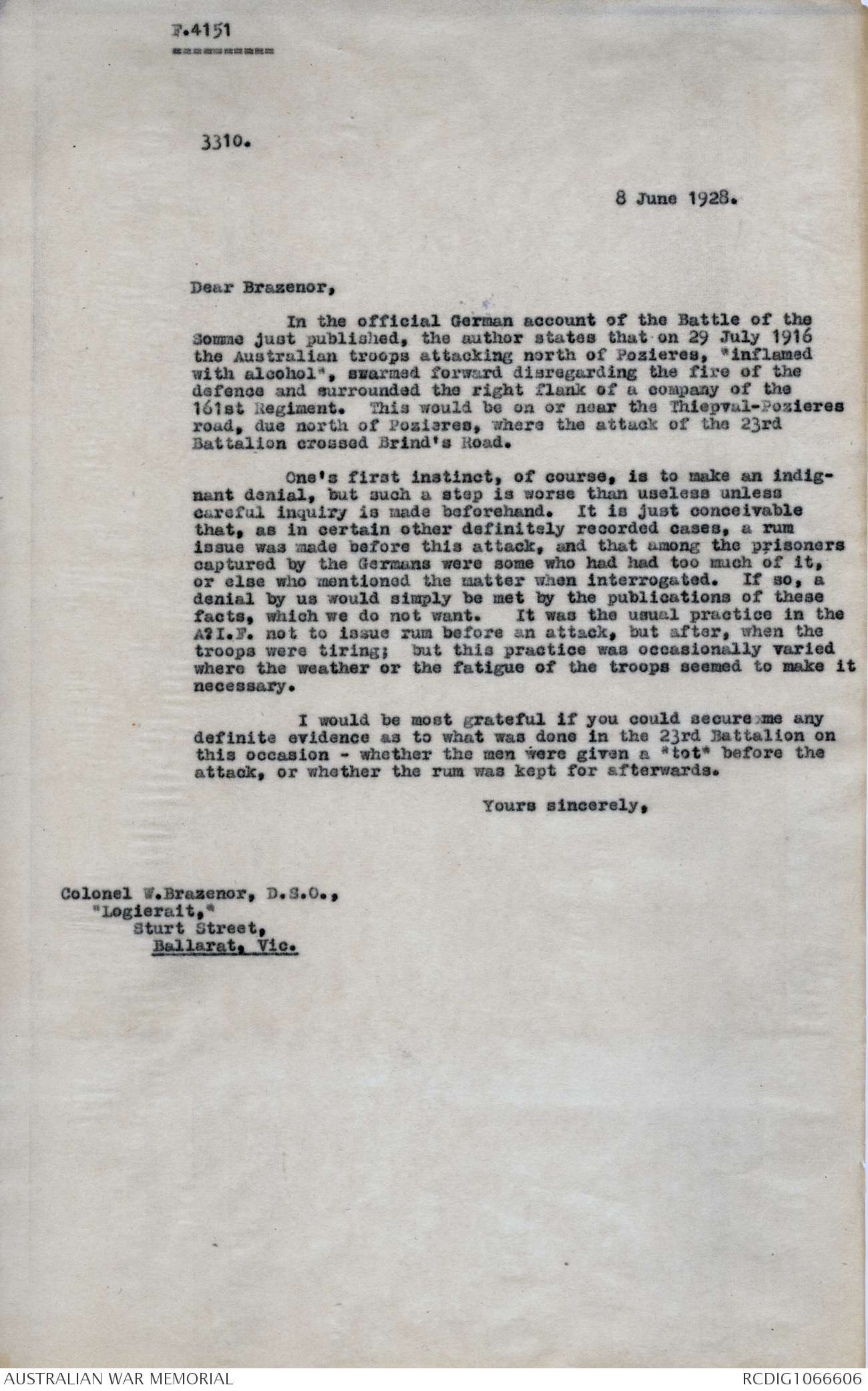
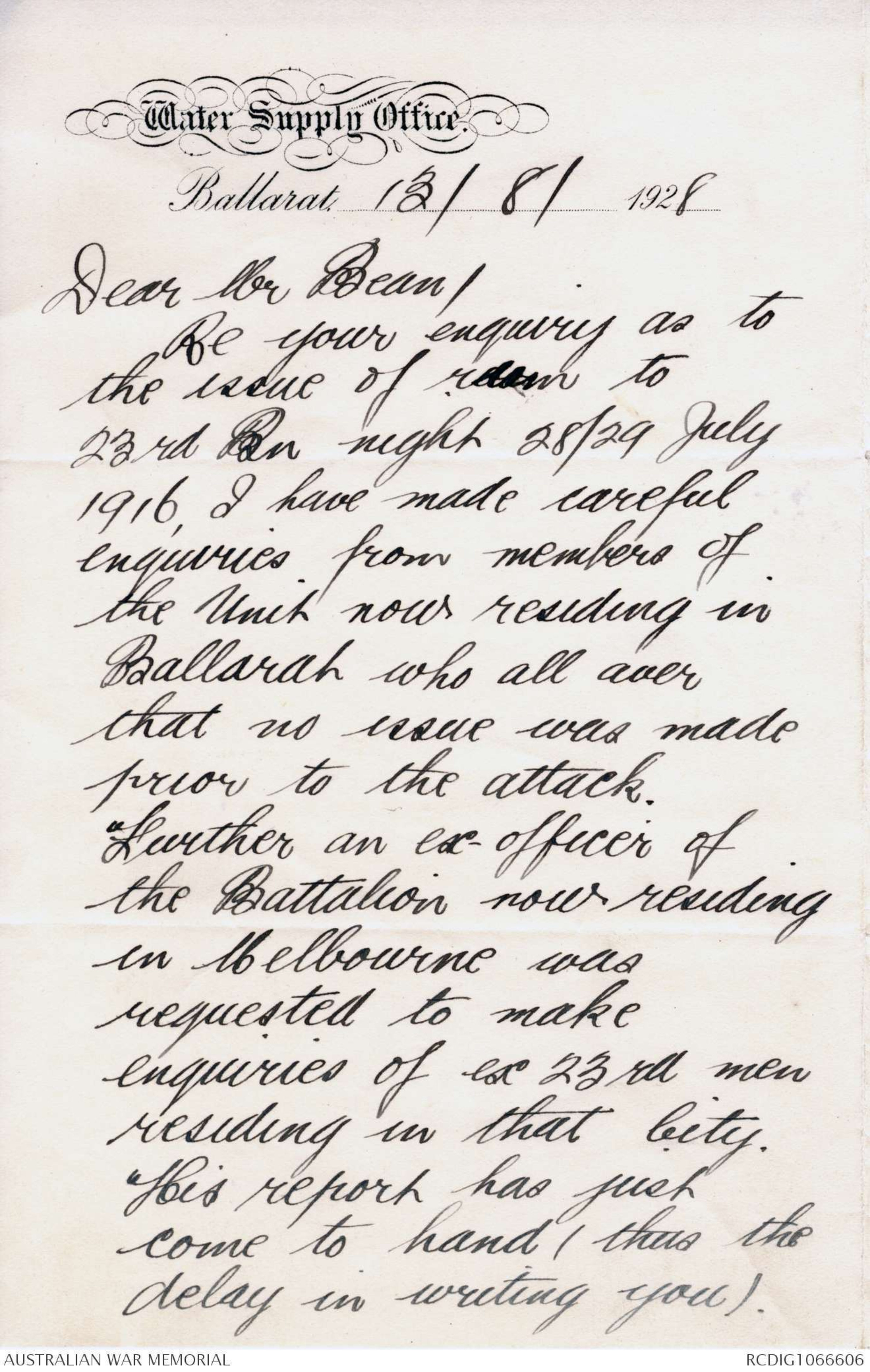
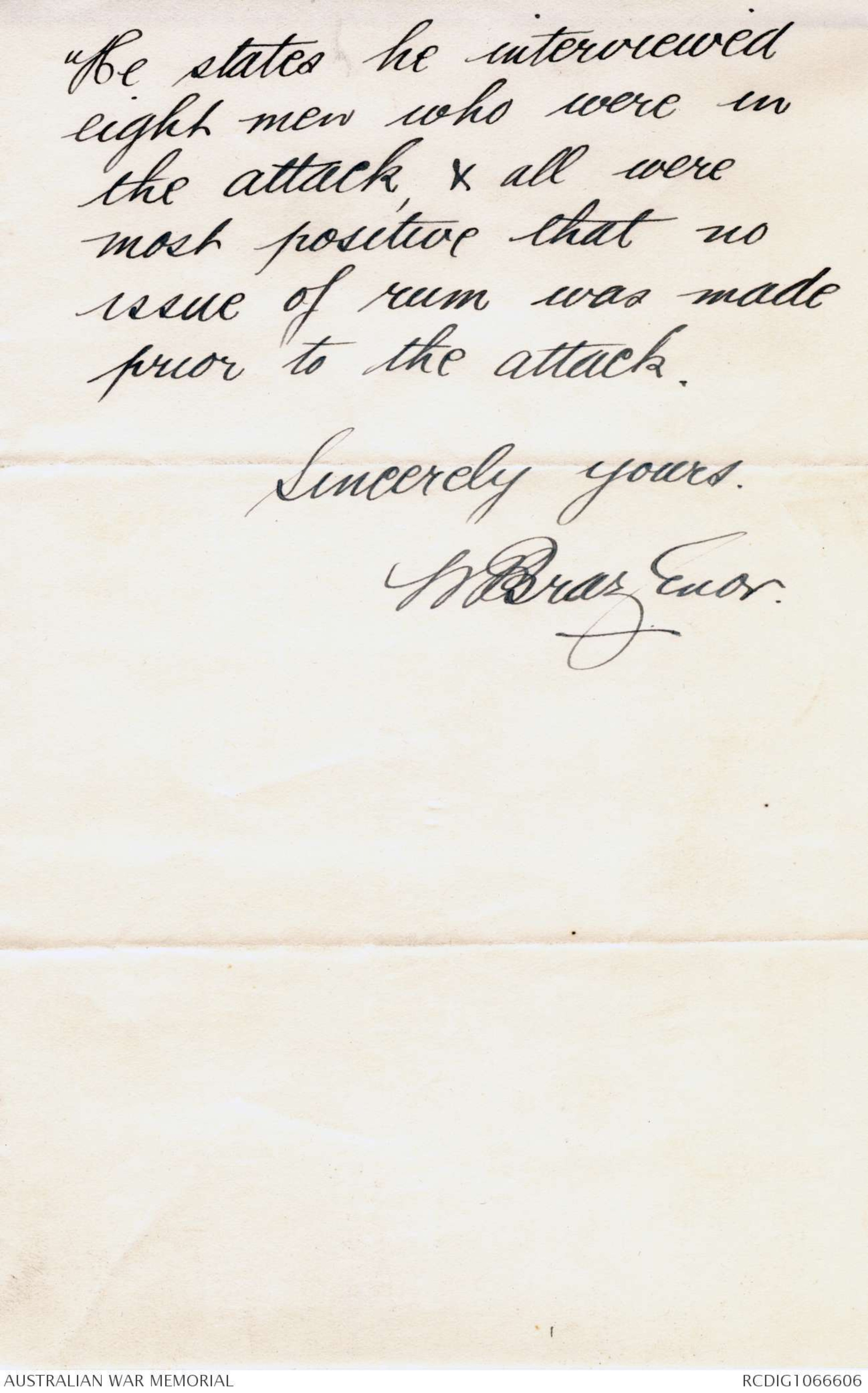
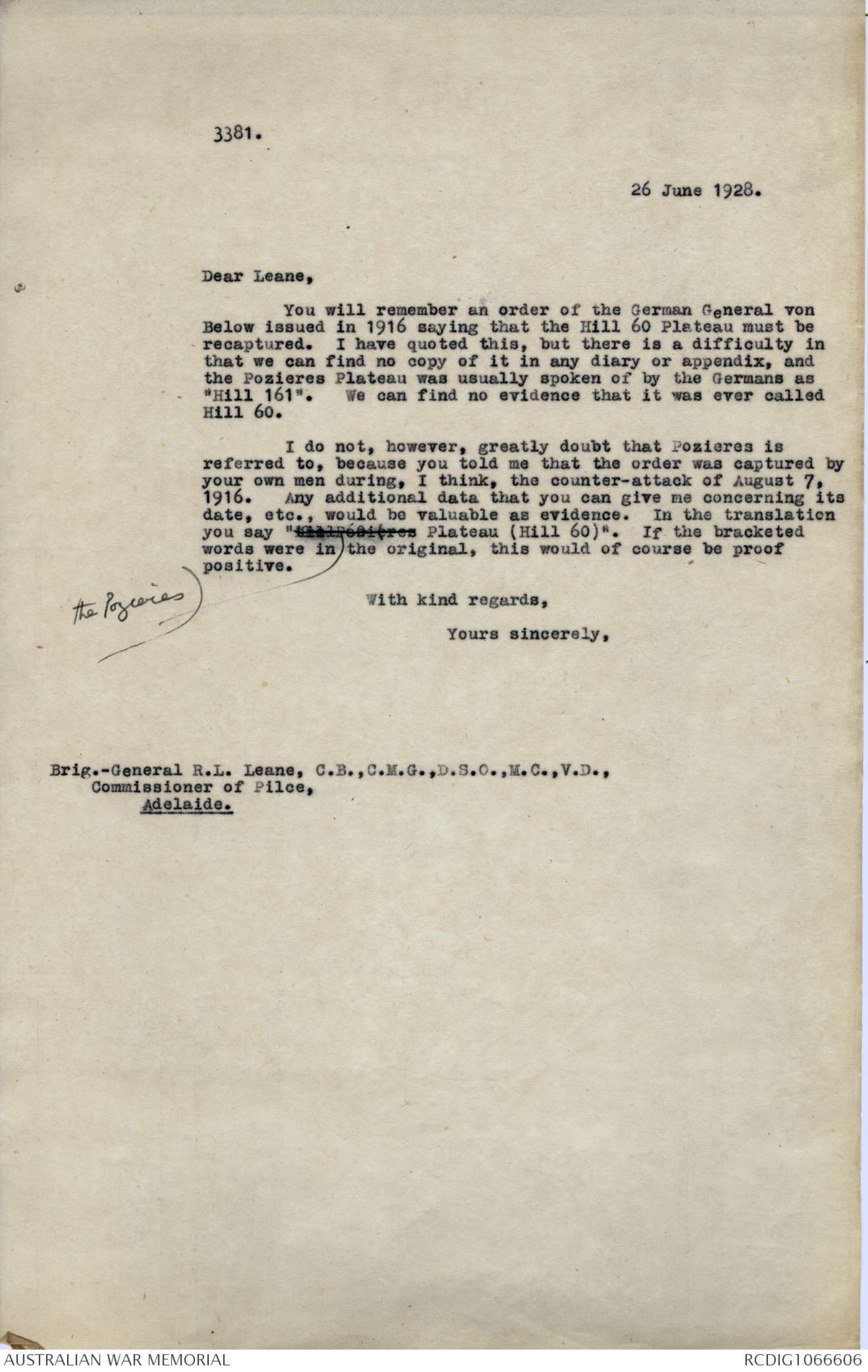
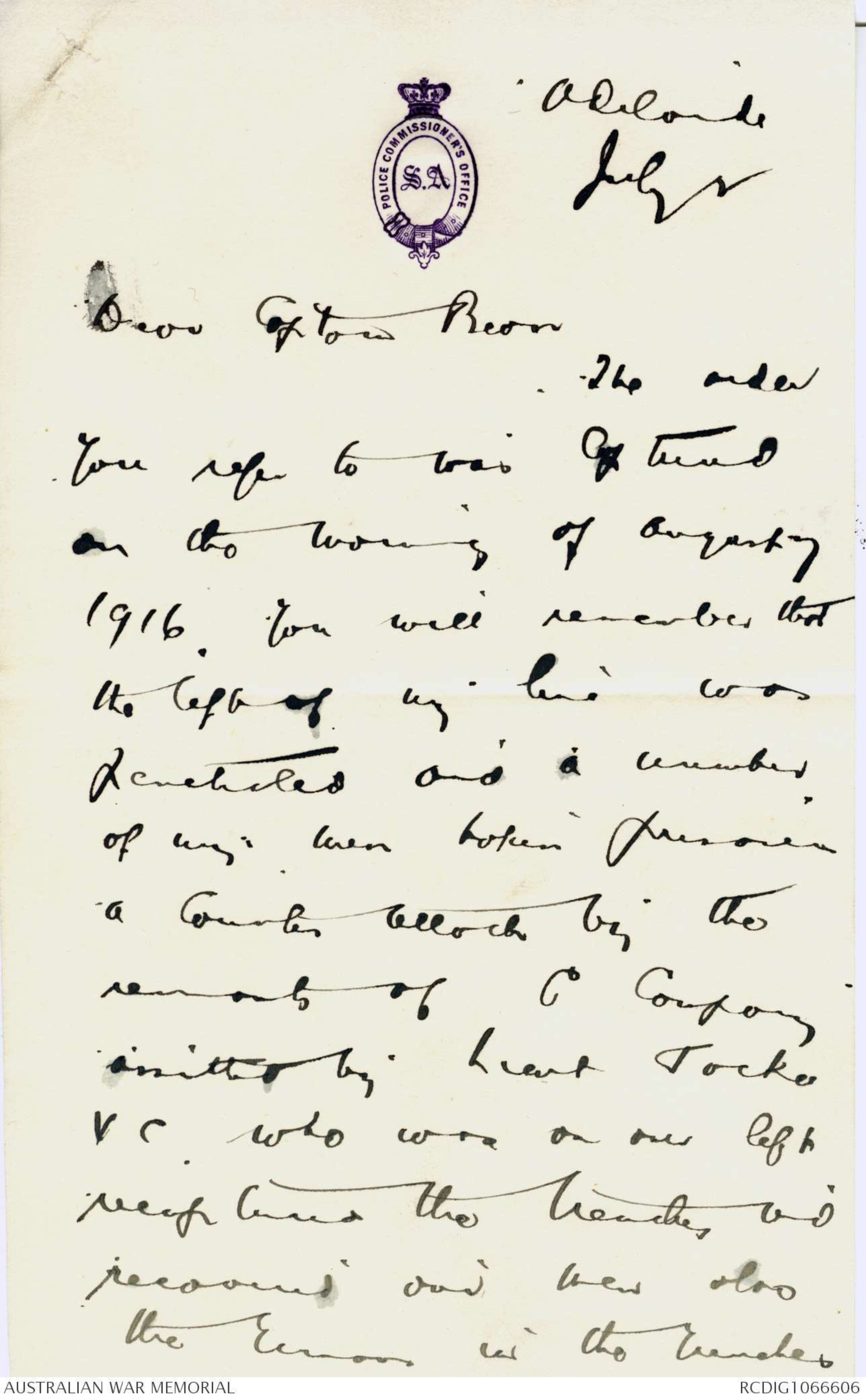
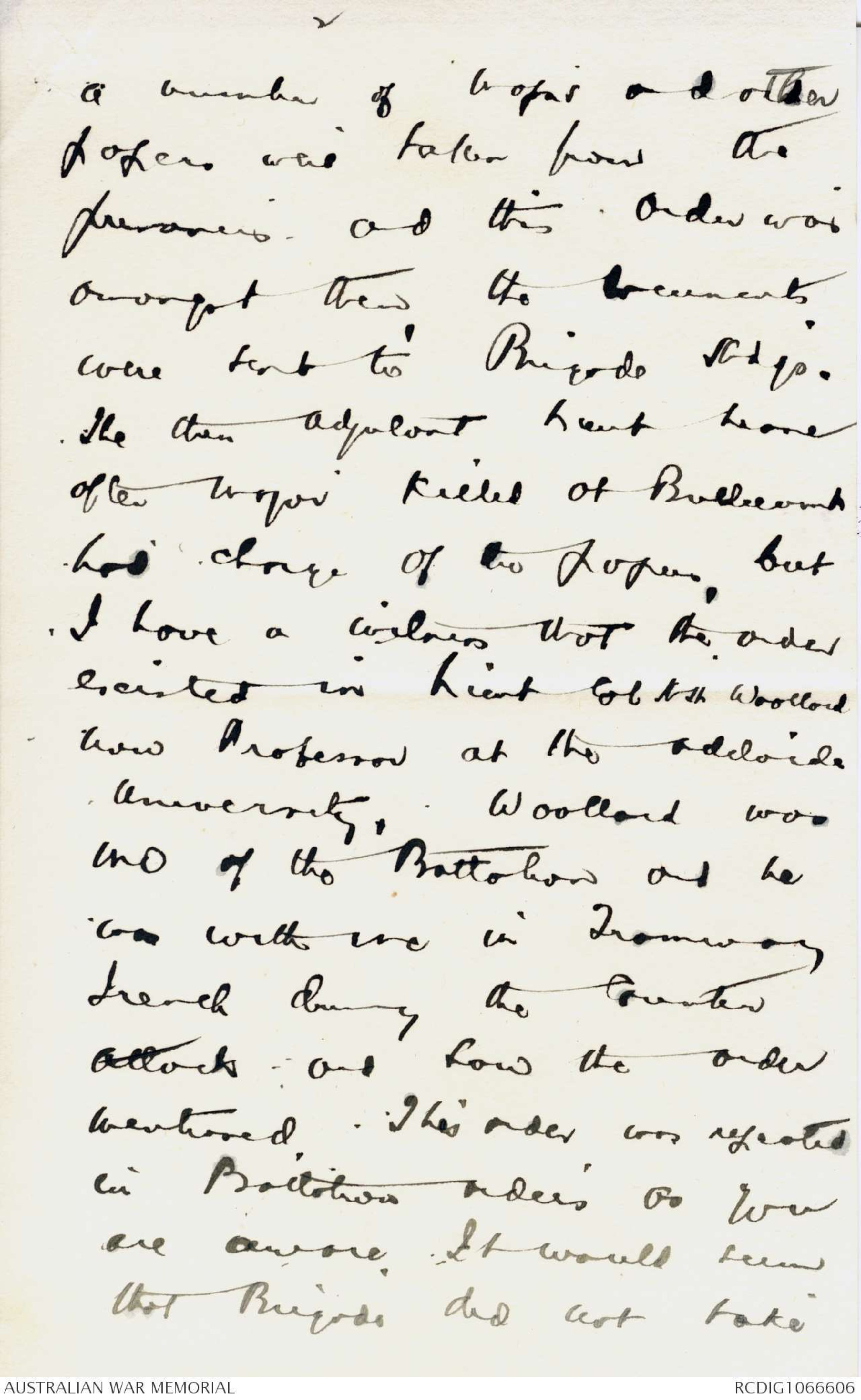
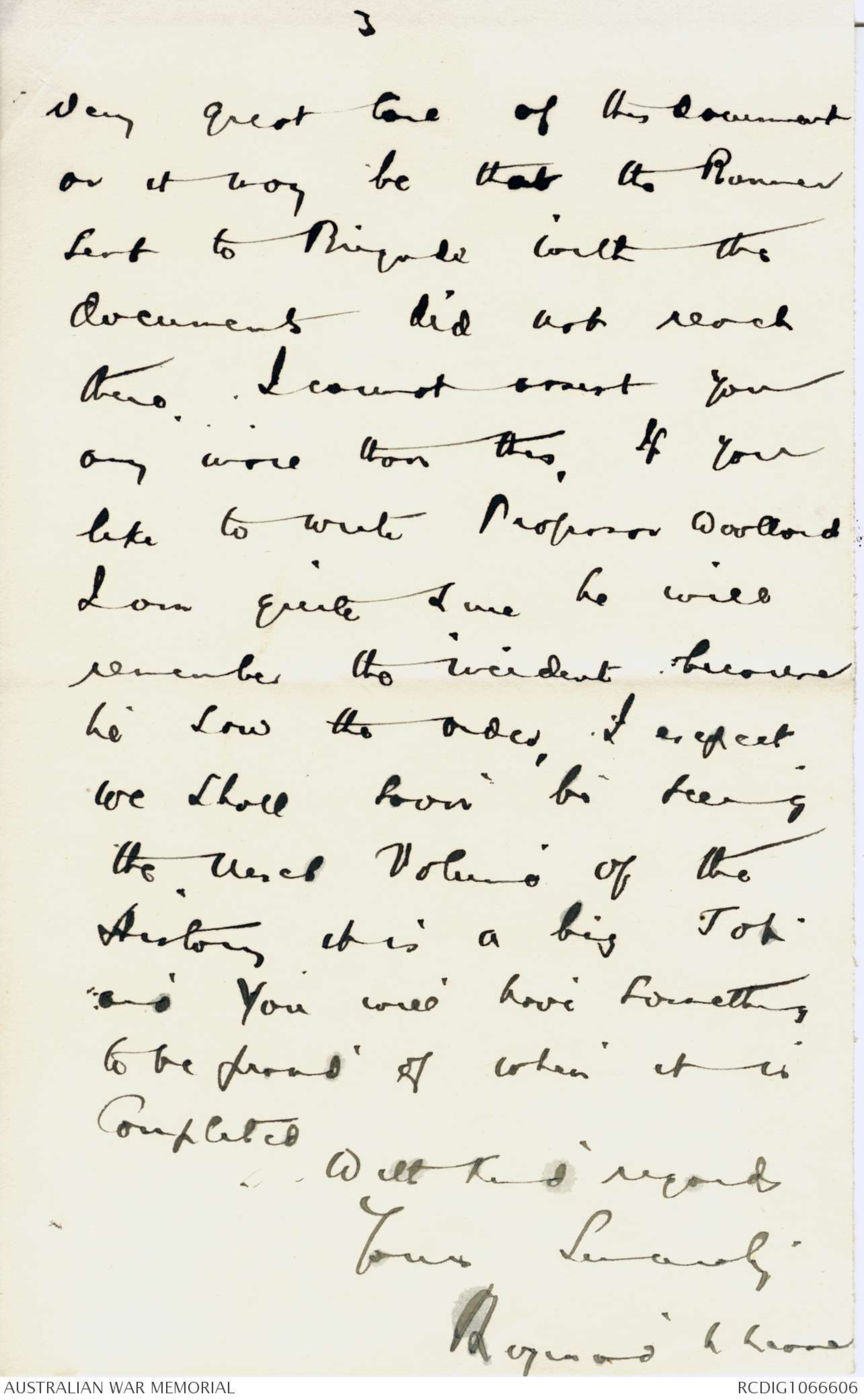
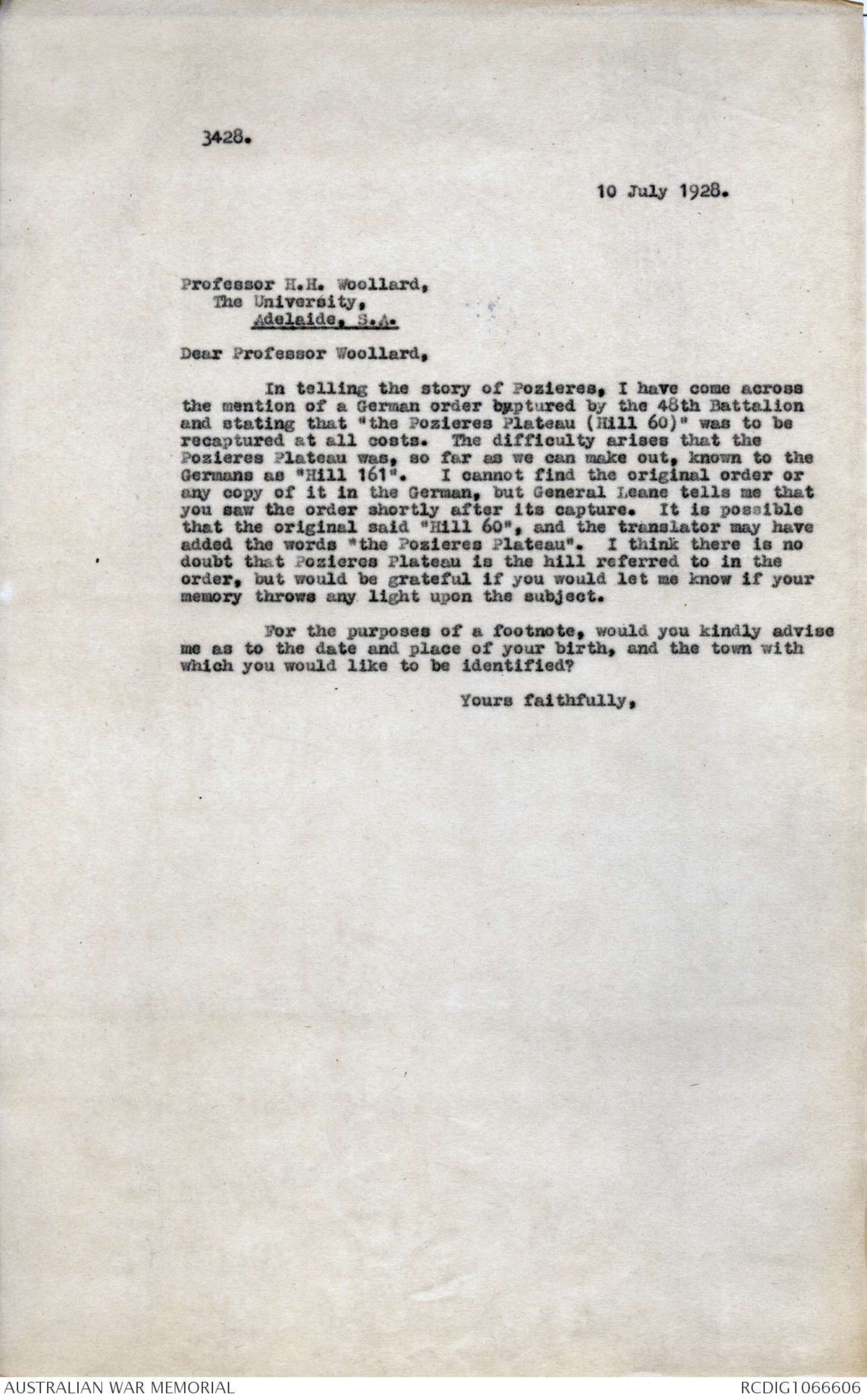
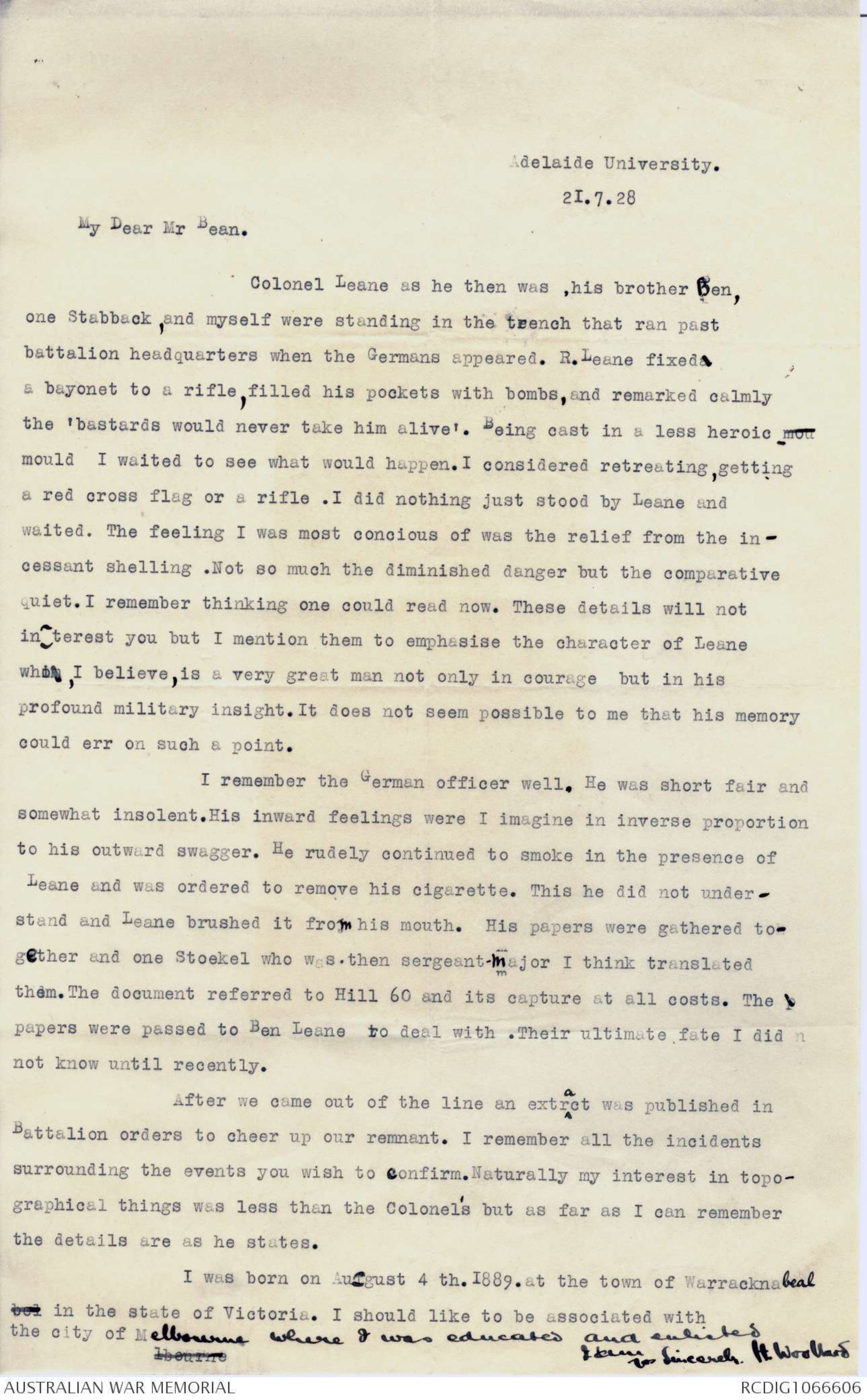
There can be no question of any official
guarantee that the item will be
included in the next list then.
What remains is this: that the attitude
of the P.M. & his colleagues leaves
me in no doubt that they are in
accord with the Board's recommendation
It seems inconceivable that in view
of that prospect there should be any
difficulty in the way of financing
the remainder of the dead period.
either by raising fresh capital or
getting a loan from the Bank.
In haste
Yours ever
J. Gellibrand
F.4151
3310.
8 June 1928.
Dear Brazenor,
In the official German account of the Battle of the
Somme just published, the author states that on 29 July 1916
the Australian troops attacking north of Pozieres, "inflamed
with alcohol", swarmed forward disregarding the fire of the
defence and surrounded the right flank of a company of the
161st Regiment. This would be on or near the Thiepval-Pozieres
road, due north of Pozieres, where the attack of the 23rd
Battalion crossed Brind's Road.
One's first instinct, of course, is to make an indignant
denial, but such a step is worse than useless unless
careful inquiry is made beforehand. It is just conceivable
that, as in certain other definitely recorded cases, a rum
issue was made before this attack, and that among the prisoners
captured by the Germans were some who had had too much of it,
or else who mentioned the matter when interrogated. If so, a
denial by us would simply be met by the publications of these
facts, which we do not want. It was the usual practice in the
AI.F. not to issue rum before an attack, but after, when the
troops were tiring; but this practice was occasionally varied
where the weather or the fatigue of the troops seemed to make it
necessary.
I would be most grateful if you could secure me any
definite evidence as to what was done in the 23rd Battalion on
this occasion - whether the men were given a "tot" before the
attack, or whether the rum was kept for afterwards.
Yours sincerely,
Colonel W.Brazenor, D.S.O.,
"Logierait,"
Sturt Street,
Ballarat, Vic.
Water Supply Office
Ballarat 13/8/1928
Dear Mr Bean,
Re your enquiry as to
the issue of rum to
23rd Bn night 28/29 July
1916, I have made careful
enquiries from members of
the Unit now residing in
Ballarat who all aver
that no issue was made
prior to the attack.
Further an ex-officer of
the Battalion now residing
in Melbourne was
requested to make
enquiries of ex 23rd men
residing in that City.
His report has just
come to hand (thus the
delay in writing you).
"He states he interviewed
eight men who were in
the attack & all were
most positive that no
issue of rum was made
prior to the attack.
Sincerely yours.
W Brazenor.
3381.
26 June 1928.
Dear Leane,
You will remember an order of the German General von
Below issued in 1916 saying that the Hill 60 Plateau must be
recaptured. I have quoted this, but there is a difficulty in
that we can find no copy of it in any diary or appendix, and
the Pozieres Plateau was usually spoken of by the Germans as
"Hill 161". We can find no evidence that it was ever called
Hill 60.
I do not, however, greatly doubt that Pozieres is
referred to, because you told me that the order was captured by
your own men during, I think, the counter-attack of August 7,
1916. Any additional data that you can give me concerning its
date, etc., would be valuable as evidence. In the translation
you say "xxxxxxxxx the Pozieres Plateau (Hill 60)". If the bracketed
words were in the original, this would of course be proof
positive.
With kind regards,
Yours sincerely,
Brig.-General R.L. Leane, C.B., C.M.G., D.S.O., M.C., V.D.,
Commissioner of Pilce,
Adelaide
Police Commissioner's Office
S.A
Adelaide
July 2
Dear Captain Bean
The order
you refer to was actioned
on the morning of August 7
1916. You will remember that
the left of mg. line was
penetrated and a number
of mg. men taken prisoner
at Courtes hillock by the
remnants of C Company
assisted by Lieut Jacka
VC who was on our left
recaptured the trenches and
recovered our men also
the Germans in the trenches
2
a number of maps and other
papers were taken from the
prisoners and this order was
amongst them the documents
were sent to Brigade Hdqs.
The then Adjutant Lieut Leane
after Major killed at Bullecourt
had charge of the papers, but
I have a witness that the order
existed in Lieut Col HH Woollard
now Professor at the Adelaide
University. Woollard was
MO of the Battalion and he
was with me in Tramway
Trench during the Counter
attack and saw the order
mentioned. This order was repeated
in Battalion orders as we
are aware. It would seem
that Brigade did not take
3
very great care of this document
or it may be that the Runner
sent to Brigade with the
document did not reach
there. I cannot assist you
any more than this. If you
like to write Professor Woollard
I am quite sure he will
remember the incident because
he saw the order. I expect
we shall soon be seeing
the next Volume of the
History it is a big Job
and You will have something
to be proud of when it is
completed
With kind regards
Yours Sincerely
Raymond L Leane
3428.
10 July 1928.
Professor H.H. Woollard,
The University,
Adelaide, S.A
Dear Professor Woollard,
In telling the story of Pozieres, I have come across
the mention of a German order captured by the 48th Battalion
and stating that the Pozieres Plateau (Hill 60): was to be
recaptured at all costs. The difficulty arises that the
Pozieres Plateau was, so far as we can make out, known to the
Germans as "Hill 161". I cannot find the original order or
any copy of it in the German, but General Leane tells me that
you saw the order shortly after its capture. It is possible
that the original said "Hill 60", and the translator may have
added the words "the Pozieres Plateau". I think there is no
doubt that Pozieres Plateau is the hill referred to in the
order, but would be grateful if you would let me know if your
memory throws any light upon the subject.
For the purposes of a footnote, would you kindly advise
me as to the date and place of your birth, and the town with
which you would like to be identified?
Yours faithfully,
Adelaide University.
21.7.28
My Dear Mr Bean.
Colonel Leane as he then was, his brother Ben,
one Stabback, and myself were standing in the trench that ran past
battalion headquarters when the Germans appeared.
R. Leane fixed a
a bayonet to a rifle, filled his pockets with bombs, and remarked calmly
the 'bastards would never take him alive'. Being cast in a less heroic mou
mould I waited to see what would happen. I considered retreating, getting
a red cross flag or a rifle. I did nothing just stood by Leane and
waited. The feeling I was most conscious of was the relief from the incessant
shelling. Not so much the diminished danger but the comparative
quiet. I remember thinking one could read now. These details will not
interest you but I mention them to emphasise the character of Leane
whom, I believe, is a very great man not only in courage but in his
profound military insight. It does not seem possible to me that his memory
could err on such a point.
I remember the German officer well, He was short fair and
somewhat insolent. His inward feelings were I imagine in inverse proportion
to his outward swagger. He rudely continued to smoke in the presence of
Leane and was ordered to remove his cigarette. This he did not understand
and Leane brushed it from his mouth. His papers were gathered together
and one Stoekel who was. then sergeant-major I think translated
them. The document referred to Hill 60 and its capture at all costs. The &
papers were passed to Ben Leane to deal with. Their ultimate fate I did
not know until recently.
After we came out of the line an extr∧act was published in
Battalion orders to cheer up our remnant. I remember all the incidents
surrounding the events you wish to confirm. Naturally my interest in topographical
things was less than the Colonel's but as far as I can remember
the details are as he states.
I was born on August 4 th. 1889. at the town of Warracknabealbes in the state of Victoria. I should like to be associated with
the City of Melbourne lbourne where I was educated and enlisted
I am
yrs Sincerely. H. Woollard
 Maralyn K
Maralyn KThis transcription item is now locked to you for editing. To release the lock either Save your changes or Cancel.
This lock will be automatically released after 60 minutes of inactivity.